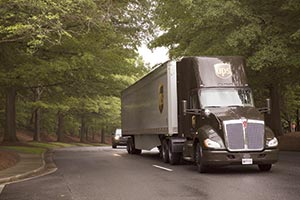UPS to Invest Another $100 Million to Expand Its Natural-Gas Network

UPS Inc. will invest an additional $100 million to expand its network of natural gas-powered freight transportation. The expansion will include building 12 more private fueling stations and buying 380 more heavy- duty tractors, the company said.
Also last week, Matheson Postal Services, a division of Sacramento, California-based Matheson Trucking Inc., announced it added 25 new compressed natural gas and 12 liquefied natural gas tractors to its fleet.
UPS said the expansion will support its small-package division, with the first new station expected to open in May. The others will open later this year.
“CNG is part of a broad investment in a variety of alternative-fuel vehicles. Taken together, all of our alternative-fuel vehicles represent 6% of the more than 100,000 UPS global fleet and have driven a 10% annual reduction in use of conventional fuel,” Mark Wallace, senior vice president for global engineering and sustainability, said in a statement.
UPS, which ranks No. 1 on the Transport Topics Top 100 list of the largest U.S. and Canadian for-hire carriers, has 18 CNG stations operating in the United States as well as in Germany, the Netherlands and Thailand.
Atlanta-based UPS said it will buy the T680 highway tractors from Kenworth Truck Co., a division of Paccar Inc. The vehicles will use CNG in Cummins Westport ISX12 G engines.
Four of the 12 CNG stations will be in Texas — Amarillo, El Paso, Fort Worth and San Antonio — and one each in Arizona, Colorado, Georgia, Kansas, Nevada, Pennsylvania, South Carolina and Tennessee.
TruStar Energy will build the stations, and Agility Fuel Systems and Quantum Fuel Systems will provide the CNG systems.
“We appreciate what all of these companies and others do. The decision [of which to use] could be different next time,” Mike Casteel, director of fleet procurement at UPS, told TT.
Casteel said the sites were chosen because of an area’s available infrastructure to deliver CNG via pipelines and not in order to support particular customers.
The new CNG vehicles will replace older diesel trucks, which will be shifted to new locations to replace still older diesel vehicles there, he said.
“It involves a lot of coordination, but this is relatively normal for us,” Casteel said.
The company said its U.S. fleet includes more than 6,840 all-electric, hybrid-electric, hydraulic-hybrid, CNG, liquefied natural gas and propane-powered vehicles.
Meanwhile, Matheson said, it introduced 12 LNG Kenworth T880 day cabs in Oakland, California, and has completed the deployment of 17 CNG Kenworth T680s in Boise, Idaho. The company is in the process of taking delivery of eight additional CNG T680 sleeper cabs for its Los Angeles-to-Seattle runs.
According to Matheson, the firm is among the top 10 largest contract carriers for the U.S. Postal Service.
The CNG tractors pull a mix of trailers in Boise, with most in the 53-foot category, used to transport U.S. Postal Service mail along designated routes.
“We plan to increase our inventory of green CNG tractors in the fleet wherever it is practical and cost-effective to do so and while diesel may still have an edge on longhaul routes,” Joshua Matheson, vice president of operations, said in a statement.
These new vehicles bring the company’s tractor fleet total across all divisions to 262, excluding rental tractors, in its nationwide network, the company said.

